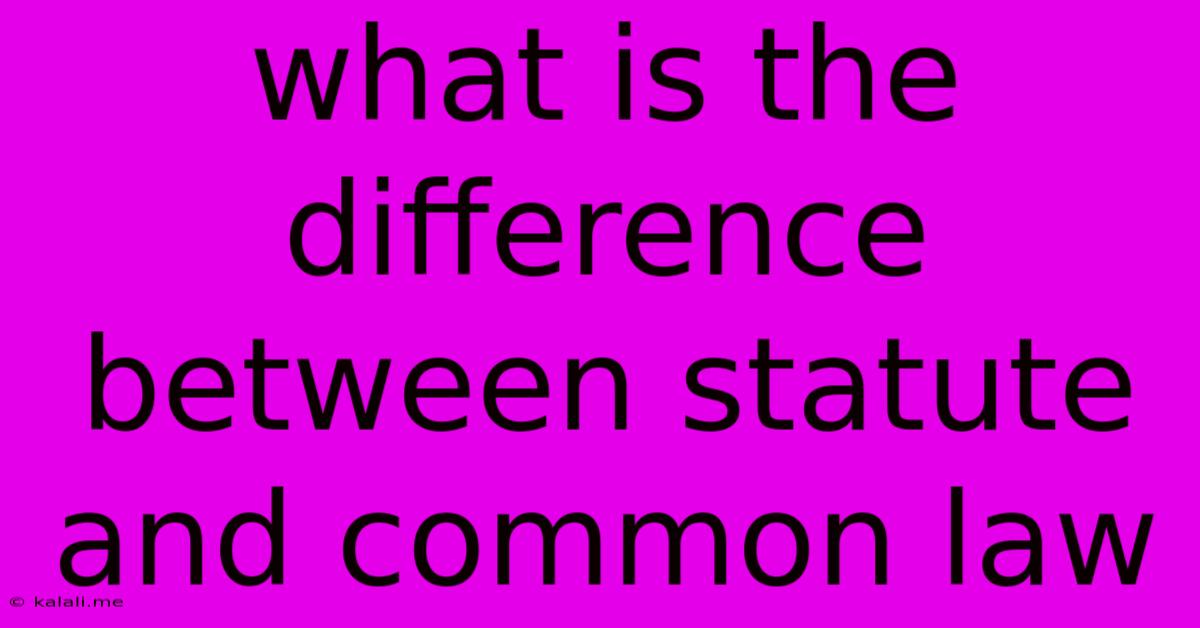What Is The Difference Between Statute And Common Law
Kalali
Jun 14, 2025 · 3 min read

Table of Contents
Statute Law vs. Common Law: Understanding the Key Differences
This article delves into the fundamental differences between statute law and common law, two pillars of the legal systems in many countries, particularly those with a history rooted in English common law. Understanding these distinctions is crucial for anyone navigating the legal landscape, whether as a legal professional, a business owner, or simply an informed citizen. We'll explore their origins, how they're created, and their impact on legal decisions.
What is Statute Law?
Statute law, also known as statutory law, is the written law passed by a legislative body, such as a parliament or congress. These laws are codified, meaning they're formally documented and accessible to the public. Statutes address a wide range of issues, from criminal offenses and contract law to environmental regulations and tax codes. The process of creating a statute typically involves drafting, debate, amendment, and finally, formal enactment by the legislative body. Once enacted, it becomes binding law, superseding any conflicting common law precedents. Examples include traffic laws, tax laws, and the Clean Air Act.
Key Characteristics of Statute Law:
- Written and codified: Exists in a formal, written document.
- Created by a legislature: Passed by a democratically elected body.
- Specific and precise: Aims to address specific issues with clear language.
- Superior to common law: In cases of conflict, statutes generally override common law.
- Amendable and repealable: Can be modified or revoked by subsequent legislation.
What is Common Law?
Common law, also known as case law or judge-made law, is derived from judicial decisions rather than from written statutes. It originates from the principle of stare decisis, meaning "to stand by things decided." This principle dictates that courts should follow precedents set by previous decisions in similar cases. Over time, consistent judicial interpretations of legal principles create a body of common law that guides future rulings. Judges interpret statutes, apply legal principles to specific situations, and create precedents that evolve and shape the law organically. This is a crucial element of the legal system in countries like the United States, Canada, and the United Kingdom.
Key Characteristics of Common Law:
- Judge-made law: Developed through judicial decisions and interpretations.
- Based on precedent: Relies heavily on stare decisis.
- Evolves organically: Adapts to changing circumstances and societal values.
- Can be overruled by statute: Statutes can supersede conflicting common law principles.
- Flexibility and adaptability: Can address nuanced situations and legal grey areas.
Key Differences Summarized:
| Feature | Statute Law | Common Law |
|---|---|---|
| Source | Legislature | Courts |
| Form | Written and codified | Judge-made decisions, precedents |
| Creation | Legislative process | Judicial interpretation and application |
| Nature | Specific and precise | Evolving and adaptable |
| Hierarchy | Generally overrides conflicting common law | Can be overruled by statute |
| Flexibility | Less flexible | More flexible |
Interaction Between Statute and Common Law
It's crucial to understand that statute and common law don't exist in isolation. They often interact and complement each other. Statutes often provide a framework, while common law fills in the gaps and interprets the application of those statutes. Courts interpret statutes and apply common law principles to resolve disputes. The dynamic interplay between these two legal systems ensures the legal system can remain responsive to societal needs while maintaining consistency and predictability.
In conclusion, understanding the differences between statute and common law is essential for navigating the legal landscape. While statute law provides a written framework, common law offers flexibility and adaptability. Their interaction creates a rich and complex legal system capable of addressing a wide spectrum of societal challenges and evolving with the times.
Latest Posts
Latest Posts
-
How To Find Minor Of Matrix
Jun 14, 2025
-
What Is The Most Destructive Seismic Wave
Jun 14, 2025
-
How Is Amplitude Related To Energy
Jun 14, 2025
-
What Is The Meaning Of The Underlined Idiom
Jun 14, 2025
-
Difference Between Article And Journal Title
Jun 14, 2025
Related Post
Thank you for visiting our website which covers about What Is The Difference Between Statute And Common Law . We hope the information provided has been useful to you. Feel free to contact us if you have any questions or need further assistance. See you next time and don't miss to bookmark.